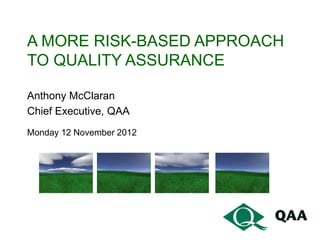“A more risk-based approach to quality assurance” - Anthony McClaran, Chief Executive QAA
- 1. A MORE RISK-BASED APPROACH TO QUALITY ASSURANCE Anthony McClaran Chief Executive, QAA Monday 12 November 2012
- 2. Presentation i) Update on QAA ii) Background to a more risk-based approach to quality assurance in England iii) Outcomes of the HEFCE consultation iv) Next steps & issues for consideration
- 3. QAA TODAY Some of QAA’s main UK activities today: Review and audit programmes for universities, further education colleges and private providers Adviser to Privy Council on applications for degree-awarding powers and university title Provider of Educational Oversight, on behalf of UK Border Agency, for ‘Highly Trusted Sponsor’ status for independent institutions with overseas students UK Quality Code for Higher Education
- 4. BACKGROUND TO A MORE RISK-BASED APPROACH TO QUALITY ASSURANCE
- 5. White Paper: Students at the Heart of the System (June 2011) Technical Consultation: A New Fit-for-Purpose Regulatory Framework for the Higher Education Sector (August 2011)
- 6. “The consultation has reinforced our view that a risk-based approach is the most desirable means of regulating higher education in England.” BIS statement (June 2012)
- 7. OUTCOMES OF THE HEFCE CONSULTATION: A RISK-BASED APPROACH TO QUALITY ASSURANCE
- 8. SCOPE OF THE HEFCE CONSULTATION Varying nature, frequency & intensity of reviews Risk ‘triggers’, concerns and out- of-cycle interventions The role of enhancement Student engagement in quality assurance Data sources and information ‘Core’ and ‘module’ approach
- 9. THEMES EMERGING FROM CONSULTATION RESPONSES Building on existing Institutional Review method Reducing unnecessary burden and achieving better regulation Greater transparency Tailoring reviews to individual circumstances Continued emphasis on enhancement Students as full partners in the process
- 10. KEY OUTCOMES: REVIEW CYCLES Six year review cycle For those with longer track records of successfully assuring quality and standards Minimum of two institutional reviews Four year review cycle For those with shorter track records Not yet undergone two successful reviews Or had an investigation under the QAA Concerns Scheme upheld since last review Or has undergone significant material changes such as takeover, merger or expansion of activities
- 11. KEY OUTCOMES: GREATER TRANSPARENCY & TAILORED REVIEWS Greater transparency: Publication of review programme on QAA website Reviews tailored to individual providers Single review visits: End of separate review of collaborative provision Working towards an integrated review method for all providers of higher education
- 12. KEY OUTCOMES: MID-CYCLE REVIEW AND QAA CONCERNS SCHEME End of mid-cycle reviews Safeguarding through QAA Concerns Scheme Investigating concerns about standards and quality raised by students, staff and other parties Public reports published on outcomes of investigations
- 13. KEY OUTCOMES: ENHANCEMENT & STUDENTS AT THE CENTRE Continued focus on enhancement: Student learning opportunities Thematic element of review Sharing good practice Students remain at the heart of the quality assurance and review process
- 14. DROPPED PROPOSALS Reviews: Route A and Route B Annual review of data Core and module approach More detailed plans for streamlining reviews of QAA and professional, statutory and regulatory bodies (PSRBs)
- 15. NEXT STEPS & ISSUES FOR CONSIDERATION
- 16. PROVISIONAL TIMETABLE Date Activity Nov 2012 HEFCE publishes response to the consultation QAA produces draft Operational Description and Handbook Dec 2012 – QAA holds consultation on Operational Description and Feb 2013 Handbook March 2013 Handbook published May 2013 Institutional briefings begin on the revised method onwards Reviewer training begins Sept 2013 Implementation of the new method Jan 2014 First reviews begin, under the new method 2015-16 Independent evaluation
- 17. ISSUES & CHALLENGES Achieving the right balance of interests: Lighter touch Students at the heart Transparent and consistent QAA’s professional judgement Building a truly tailored approach for each institution Establishing a robust process with a clear framework
- 18. REGULATORY PARTNERSHIP GROUP FOR ENGLAND
- 19. BREAK-OUT GROUP QUESTIONS i) What are the benefits of this new approach? ii) What are the likely impacts of new alternative providers on quality and reputation in UK higher education? iii) How do we ensure that a more risk-based system can still nurture innovation?
- 20. www.qaa.ac.uk

